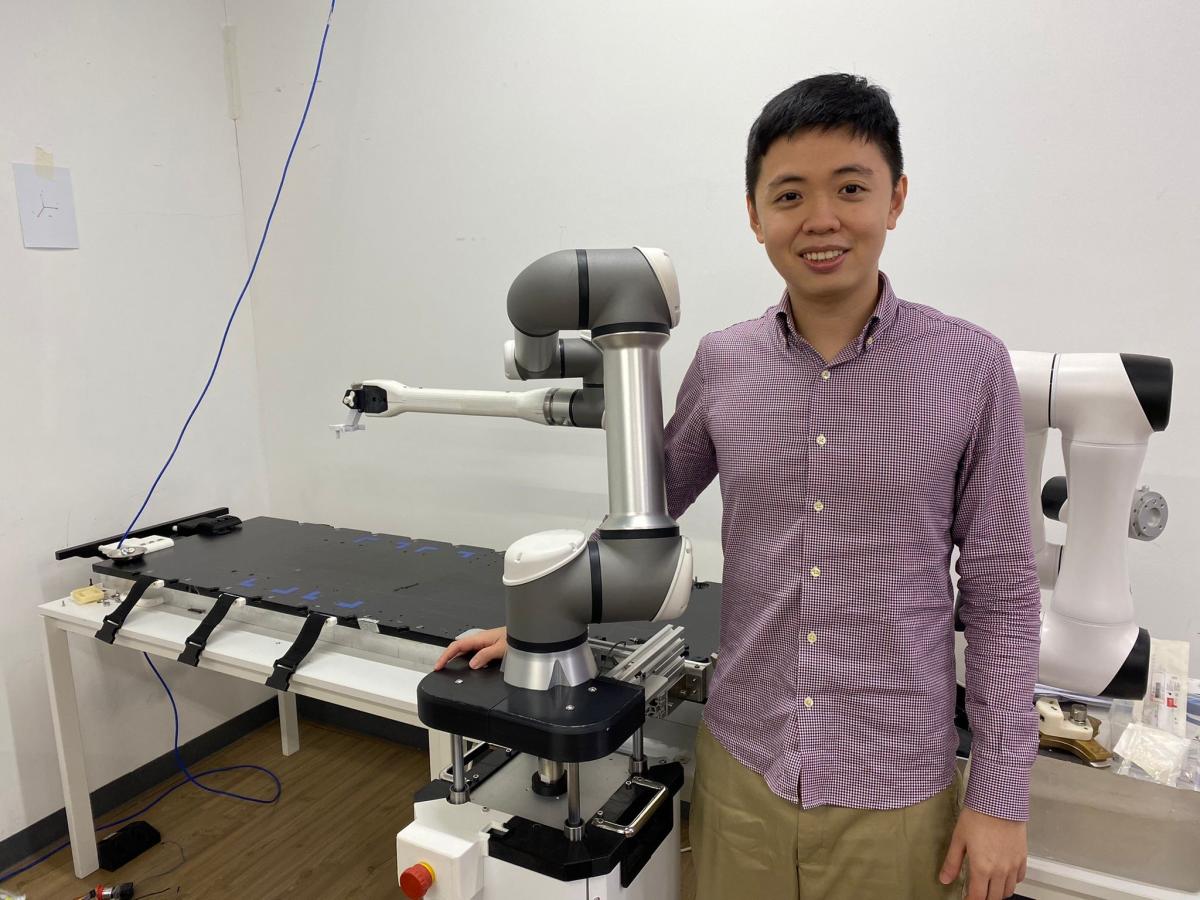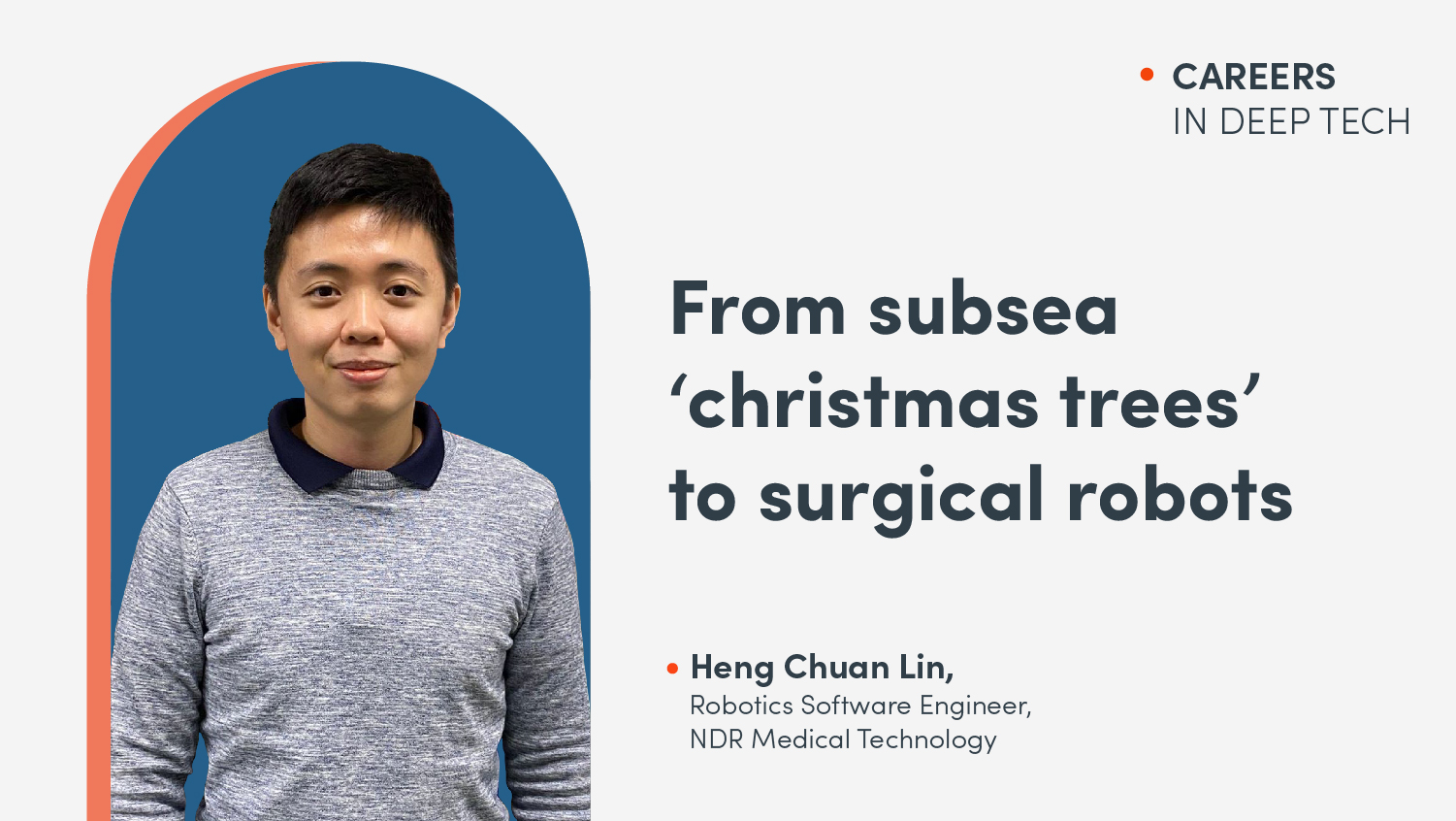Careers in Deep Tech: From Subsea ‘christmas trees’ to surgical robots
Thu, 08/18/2022 - 12:00
In this conversation with SGInnovate, Heng Chuan Lin shares his experiences switching careers from the oil and gas industry to medical robotics. A mechanical engineer by training, he earned his bachelor’s degree at the National University of Singapore, and worked for two years as a subsea mechanical design engineer. Heng Chuan later took on an apprenticeship in the inaugural run of SGInnovate’s PowerX talent programme, which combines modular training with on-job experience. Now, Heng Chuan is a Senior Robotics Software Engineer at NDR Medical, providing AI-empowered interventional robotics for image-guided clinical procedures.
Tell us more about yourself, and your first job in the oil and gas industry.
While I was an undergraduate, my understanding of various career pathways was based solely on word of mouth and some internship experience. I spoke to people who had built long careers in different sectors, but even then, it was still hard to grasp how it would be like working in these industries. I decided to work as subsea mechanical design engineer when I graduated which was quite unique, while also allowing me to utilise most of the mechanical skillsets I had picked up on large-scale projects.
While in the oil and gas industry, I worked on a subsea ‘Christmas tree’, a type of subsea resource extraction equipment. The job involved developing the physical mechanical design as well as managing production processes. This were aimed at improving the functionality and efficiency of the subsea technology or to develop new products and services from existing technology. I had the opportunity to travel to Scotland to provide technical expertise for the manufacturing and testing process.
What prompted you to make a career switch to medical robotics?
After working for two years in the oil and gas sector, I had encountered some frustrations. The industry had also been on the decline for a while, with the COVID-19 situation creating additional challenges. Thus, I was looking for opportunity to make a career switch.
I decided to switch to robotics because it is interesting to develop the robotics system and I believe there is good growth potential in this sector. Furthermore, I had taken courses related to robotics kinematics and automation when I was an undergraduate so it was a natural fit for me. In addition, I also wanted do something good for society so a career in surgical robotics appealed to me.
What challenges did you face in making your career transition and how did you overcome them?
In my previous job, I dealt with mechanical work, which was completely unrelated to software programming. I did pick up some programming knowledge during my university period but it isn’t sufficient. Software programming and its applications evolve very quickly, so there were a lot of things to catch up on when I started on the PowerX programme.
I don’t consider myself a fast learner, so I did a lot of reading and learning on my own time to pick up the skills and knowledge required for my role. I am also thankful that my team at NDR Medical gives me the space and help to pick up the expertise to succeed in this role.
For me, learning is a lifelong process. When I was working, I took up certification courses and skills for finance and other industries. Though I did not go down those career pathways, I don’t find it a waste of time as it helped me broaden my perspective and train my mind to be receptive to new knowledge. My belief is that I should always remain adaptable and flexible.

Heng Chuan with ANT-C, NDR Medical's smart lesion targeting system.
Tell us more about your projects and responsibilities as a robotics software engineer at NDR Medical.
Right now, I am working on NDR Medical’s ANT-C system, an automated needle targeting system for computed tomography (CT) scans. We use this system to assist in needle targeting surgeries such as biopsy and ablation, improving the overall precision and safety of such procedures by helping doctors navigate and visualise the needle’s trajectory into the patient’s body. I work mainly on the algorithms for robot-related features, such as path planning, accuracy, and collision. I also help to perform the trial planning, data collection and analysis.
Sometimes, we have to travel abroad to countries, such as the Netherlands or Japan, to demonstrate the functionality of our robots to doctors. It is important to get feedback directly from the doctors who are the end users. By understanding what our end users need, we can then improve our technology. The data that we collect through these overseas experiments are also valuable for publishing papers and supporting the effectiveness of our innovations.
What are some of the most memorable or fulfilling experiences you’ve had on the job?
Planning and conducting the trial experiments with our technology in different countries’ hospitals, a unique experience that not many would have. We recently completed some successful trials using our ANT-C system. Conducting a successful animal trial can demonstrate the safety and feasibility of our technology, and also takes us a step closer to testing this system on humans. The experiment went well, and we collected a lot of useful data to improve the product further.
I also find it fulfilling to try out new technologies in my current role. In my last job, most of the protocols were already set in stone and there is a standard procedure for us to follow. But as NDR Medical is a startup, there is more flexibility. I get to think outside the box, as well as test a variety of solutions with minimal restrictions on our creativity.
Can you share any advice for career switchers looking to enter the tech sector?
Everyone’s experience in the tech sector will differ slightly, depending on things like company culture, and the specific subfields or projects they are working on. Most people who are looking to join the tech sector will likely need to be prepared to learn and adapt to new information quickly. I would advise picking up new tech skills on your own and build some personal projects to get a glimpse of what’s needed or prepare yourself to enter the industry. Being open to learning is the fundamental mentality that anyone should have to thrive in the tech sector.
Want to make the switch into Deep Tech? Join SGInnovate’s PowerX programme and equip yourself with the essential skills to embark on a new career in Deep Tech.
Trending Posts
- From satellites to startups, Singapore’s space sector is pushing new frontiers
- How leaders should rethink cybersecurity strategy
- How to Future-Proof a Career in Deep Tech? Start here.
- The future of fusion energy: What will it take to bring the power of the stars to earth?
- Keeping satellites safe: How CYSAT Asia 2026 is tackling space cybersecurity






